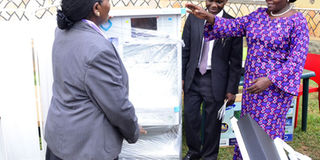Mulago receives fistula equipment

State minister in charge of Primary Healthcare Sarah Opendi (R) receives the heart monitoring machine from United Nations Population Fund country representative Esperence Fundira (L) as Mulago hospital executive director, Dr Baterana Byarugaba (C) looks on. The heart monitoring machine is among the equipment that have been donated to Mulago National Referral Hospital labour ward and fistula unit. PHOTO BY DOMINIC BUKENYA
What you need to know:
While receiving the equipment, Ms Sarah Opendi, the State minister for Health in charge of Primary Healthcare said equipment alone cannot reduce maternal mortality rates
Kampala. The obstetrics and gynaecology department at Mulago hospital has received medical equipment worth Shs565 million meant to help treat patients with fistula.
The equipment consisting of delivery beds, delivery sets, anaesthetic machines, faetal heart monitors, newborn resuscitation equipment, teaching aids and fistula surgery equipment was donated by United Nations Population Fund (UNFPA) to the hospital on Thursday.
Two vehicles were also given to the Health ministry to support midwifery and fistula services, costing approximately Shs200 million.
While handing over the equipment and the vehicles to Mulago hospital through the Health ministry UNFPA country director, Esperence Fundira called for the strengthening of human resources as a way of improving the general maternal health in the country.
“Equipment alone is not enough to guarantee the quality of midwifery care. At the moment, a midwife in Uganda delivers between 350 and 500 mothers a year, that is more than twice the 175 deliveries per year per midwife recommended by the World Health Organisation,” Ms Fundira said. The equipment came after Mulago hospital was accredited last year by the International Federation of Gynaecology and Obstetrics as a training centre for fistula repair surgeons in East Africa.
While receiving the equipment, Ms Sarah Opendi, the State minister for Health in charge of Primary Healthcare said equipment alone cannot reduce maternal mortality rates.
“If challenges at home are not addressed, maternal mortality will not reduce. With only 56 per cent of women delivering at health facilities, we need to ensure that the 44 per cent can as well go for antenatal visits and deliver in hospitals to reduce mortality,” Ms Opendi said.
About fistula
According to Wikipedia Obstetric fistula (or vaginal fistula) is a medical condition in which a fistula (hole) develops between either the rectum and vagina or between the bladder and vagina after severe or failed childbirth, when adequate medical care is not available. It is considered a disease of poverty because of its tendency to occur in women in poor countries who do not have health resources comparable to developed nations.



